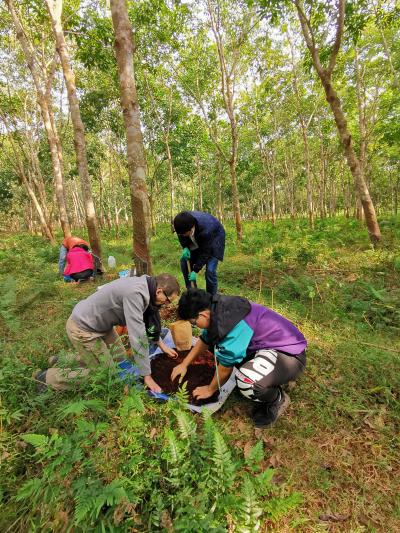- Home
- Worldwide
- Geostrategic priorities
- Cooperation and partnerships with China

Cooperation and partnerships with China
Main research fields
- Agroecology
- Soil health
- Rubber growing and natural rubber production
- Coconut palms
- Animal health and One Health
Cooperation and partnerships
CIRAD's main partners in China are universities and scientific and technical academies, which play a major role in implementing research policy in the country. The role of these academies is to support the central authorities in terms of research, training and expertise. They mostly comprise research institutes and training centres.
Main partners
- Chinese Academy of Science (CAS): Framework agreement with CIRAD signed in February 2021
- Beijing Institute of Genomics, Chinese Academy of Sciences (BIG-CAS)
- Kunming Institute of Botany (KIP-CAS): Specific agreement signed in 2020
- Chinese Academy of Tropical Agricultural Science (CATAS): Framework agreement with CIRAD renewed in 2022
- Rubber Research Institute (RRI-CATAS): Two-year post of Visiting Professor granted to a CIRAD soil health researcher, as of 1 January 2023
- Chinese Academy of Agricultural Science (CAAS): Framework agreement with the University of Montpellier/MUSE signed in March 2019
- Yunnan Academy of Agricultural Science (YAAS): Framework agreement with CIRAD renewed in 2021.
Research units and platforms in partnership for research and training (dPs) involved
Joint research units (UMRs) and dPs are conducting a broad range of activities.
Functional Ecology and Biogeochemistry of Soils and Agrosystems (UMR Eco&Sols)
- Soil health: UMR Eco&Sols works with CATAS and CAAS via its position within the Alliance of Bioversity and CIAT. The CIRAD researcher assigned to the Alliance co-coordinates two joint laboratories, in close collaboration with a Chinese scientist from each academy.
- CAAS and CATAS are part of the CMBP Asia-Pacific network. CIRAD is one of the founding members of the network, which is coordinated by its researcher Didier Lesueur
Find out more: CMBP (Common Microbial Biotechnology Platform)
Genetic Improvement and Adaptation of Mediterranean and Tropical Plants (UMR AGAP)
Work has been done with CATAS on coconut (genomics, pangenomics and genetics), and BIG-CAS in Beijing, on annotation of the Hevea genome.
- Coconut: Dynamics of diversity, societies and environments (DDSE) team
- Rubber: Cell biology of the response to abiotic and biotic stress in perennial species (BURST) team
Animals, Health, Territories, Risks, Ecosystems (UMR ASTRE) and Emerging Diseases in Southeast Asia (dP GREASE)
- Improving management of transborder animal and zoonotic diseases. The aim in the medium term is to facilitate Chinese partners' inclusion in networks and regional and international projects. Find out more: Collaborations sino-européennes en santé animale
- Chinese students are being trained via the InterRisk Masters course in Bangkok.
- With financial support from the French Embassy in China, in 2018, CIRAD's ASTRE team hosted Masters-level Chinese students interested in PhD studies in France in the field of One Health applied to antimicrobial resistance.
Find out more: UMR ASTRE, dP GREASE, China, an essential partner for the future emerging disease surveillance network, GREASE
Talks are under way within the PREZODE international initiative, aimed at including Chinese institutions and universities.
Agroecology for Southeast Asia (dP ASEA)
The Yunnan Academy of Agricultural Sciences in Kunming (YAAS) is a member of the Agroecology for Southeast Asia platform in partnership for research and training (dP ASEA).
Other contacts and collaborations
- Agricultural University of Hebei (AUH): past collaboration on the cotton value chain.
- China Animal Health and Epidemiology Center (CAHEC), Qingdao. Collaboration during avian influenza crises.
- Hong-Kong University – Pasteur Research Pole, a member of the international network of Pasteur Institutes, in the field of viruses (animal and zoonotic flu viruses) and zoonotic coronaviruses, for studies relating to Southeast Asia (Cambodia and Vietnam) and Africa.
- OMSA (OIE) Asia, FAO China and WHO China, for missions and training relating to epidemiology, health surveillance and risk analysis.
























